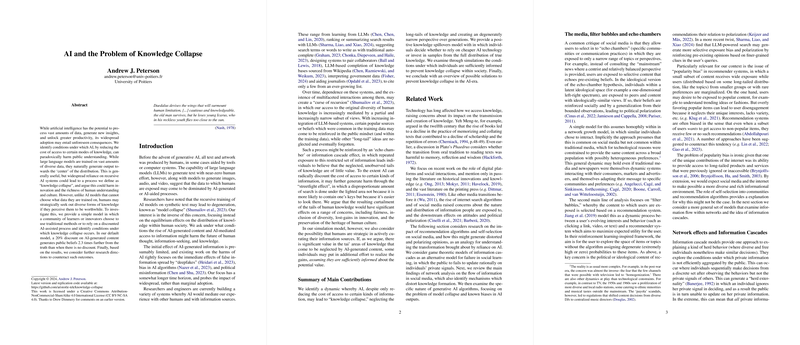AI and the Problem of Knowledge Collapse
Introduction to Knowledge Collapse in AI
The paper by Andrew J. Peterson introduces and examines the concept of knowledge collapse in the context of artificial intelligence. The widespread adoption of AI and LLMs promises to facilitate access to information and automate content generation. However, Peterson posits that this advancement might paradoxically deteriorate public understanding and societal knowledge by preferentially narrowing down the diversity of information available. The phenomenon, defined as "knowledge collapse," is explored through a combination of theoretical insights and computational modeling.
Conditions Leading to Knowledge Collapse
Peterson delineates several conditions under which knowledge collapse could occur:
- Reduction in Access Costs: The ability of AI to lower the cost of accessing specific kinds of information may inadvertently lead to a narrowing of attention towards predominantly central or popular beliefs, sidelining more diverse or peripheral knowledge.
- Recursive Use of AI Systems: The paper discusses how a cyclic reliance on AI for generating and processing information (a situation termed "curse of recursion") can lead to an iterative diminishing of knowledge diversity.
- Strategic Human Response: Unlike AI, humans can, in principle, choose to diversify their knowledge sources proactively. Whether they will do so, however, depends critically on their perception of the value of diverse knowledge forms.
Modeling Knowledge Collapse
Peterson presents a model simulating a community where individuals could either engage with traditional knowledge discovery processes or rely on AI-assisted methods. The model identifies conditions under which the public's collective beliefs diverge significantly from the truth, measured as a 2.3-fold increase in belief distance from factual accuracies in scenarios with a 20% discount on AI-generated content.
Empirical and Theoretical Implications
The theoretical model underscores a critical risk presented by the uncritical adoption of AI in knowledge generation and distribution processes. The simulation results suggest:
- Innovation and Cultural Richness at Risk: A narrowed scope of accessible knowledge threatens the breadth of human creativity and cultural heritage, potentially stifacing innovation.
- Potential for Strategic Human Intervention: The model provides a semblance of hope in its indication that strategic, well-informed human intervention could counteract trends towards knowledge collapse by valuing and seeking out diverse knowledge.
Future Directions in AI and Knowledge Preservation
Peterson concludes with considerations on preventing knowledge collapse in an AI-domineant era. Proposed measures include:
- Developing Safeguards: While outright banning of AI in content generation isn't advocated, the paper suggests implementing safeguards to maintain human engagement with diverse knowledge sources.
- Encouraging Diversity in AI Training: Ensuring AI systems are trained on a broad and representative spectrum of human knowledge could mitigate biases towards central or popular beliefs.
- Promoting Transparency: Distinguishing between human- and AI-generated content could help users critically evaluate the diversity and reliability of their information sources.
Conclusion
AI and the Problem of Knowledge Collapse presents a critical examination of the paradox inherent in AI's potential to both broaden and narrow human access to diverse knowledge. By modeling the conditions under which AI could lead to societal knowledge collapse, Peterson highlights the necessity for strategic human engagement and diversified AI training to preserve the rich tapestry of human understanding and creativity.
